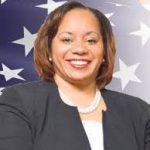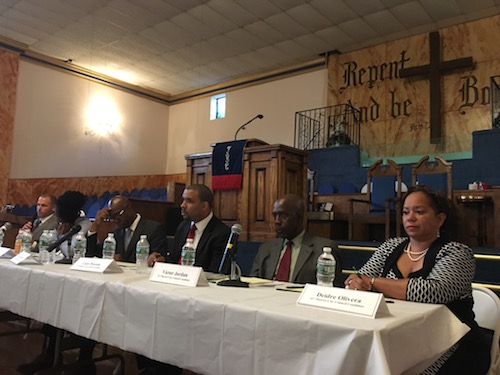With less than two weeks before primary day, six of the Democrats running for city council in the 41st District covering Brownsville and parts of Crown Heights, Bedford-Stuyvesant and East Flatbush, debated last night on everything from healthcare to public transportation.
And while the roughly 100 residents sitting inside the First Baptist Church in Brownsville, 357 Chester Street, listened attentively to the moderator’s questions on a host of issues, once audience members were able to ask questions, the most pressing issue of the election quickly became clear.
“It’s all about the land,” bellowed one concerned voter, to applause from the crowd.
“You are robbing the people,” the man continued. “I want to know, which one if you is going to play party politics, and which one of you is you going to deal with the people?”
Each of the candidates pledged to regularly check in with constituents, and put their concerns front and center, if elected.

Candidate Alicka Ampry-Samuel, of Brownsville, remarked that politicians at all levels of New York government have released plans to make housing affordable and contain gentrification.
“Everyone has a plan for our district, but the plan needs to be a plan with the community, right?” Ampry-Samuel asked rhetorically. “We are not going to be displaced, we are not going to be pushed out and forced out. Because you can have a plan but what are you going to do when you actually get to City Hall? How impressive are you going to be?”
Ampry-Samuels called for strict, community-benefit agreements with private developers, and she and other candidates broadly panned the city’s redevelopment plan of Brownsville.
Candidate Cory Provost, who comes from the East Flatbush portion of the district, said he would work to rehabilitate the district’s housing stock as well as construct new buildings where middle-class residents would be prioritized.
“We are not just going to sit by and let them build whatever they want, however they want, without us,” Provost promised.

Candidate Henry Butler, who comes from the Bed-Stuy portion of the district and who grew up in public housing, noted that in his role as Community Board 3 District Manager, he has strong experience in working with city planning, land use and zoning.
Butler acknowledged that city government had few tools to dictate rules to private developers. He said a community land trust could purchase many of 216 city-owned vacant lots in the 41st for housing development, and that non-profit developers should have access to that land.
“Their mission statement is to house people, not to make money,” Butler said. “Like Habitat for Humanity.”
Butler and others also discussed the frustration over the city’s eligibility requirements for affordable housing, which is based on the federally formulated Area Median Income (AMI). The candidates agreed that residents of the 41st District were underrepresented in New York City’s AMI index, which, for 2017, is $85,900 for a three-person family.

Candidate Diedre Olivera, who runs a community newspaper and has been an an outspoken critic of private developers during her campaign, said both the New York Housing Authority (NYCHA) and the city council were too friendly to developers, and has promised not to accept any developer donations.
“I plan on being that person on the city council floor saying ‘This plan is not working,’” Olivera said. “Housing, affordability is a sham. It’s a lie. And everybody that’s already involved in politics –if they are not already on that floor saying this is not working — I don’t know, going forward, how they are going to do that. It needs to be done, now.”
While generally agreeing on the need to provide more affordable housing, the candidates also laid out plans to goose economic activity in the district, and raise wages.
“We have to start raising up youth to become business owners, we have to have youth understanding what credit looks like,” Olivera said.

Provost said all residents of New York City should be provided free wireless Internet service, and said he would work to get an educational institution to set up shop in the district.
“One of the first things we can do is to repurpose how we think about higher education,” Provost said. “We can put a satellite campus, a real physical college campus, in the district that can serve as an incubation program for small businesses.”
Most of the candidates said that young people should have greater access to apprenticeship programs and vocational learning tailored to the 21st century.
“Some years ago, I went to George Westinghouse High School – a vocational high school,” Butler said. “Today, it appears as if we still have the same sort of vocational programs going on in our high schools.”
Butler and Olivera — both of whom have strong union ties — championed union membership as correlated to decreased poverty.
“We have to start raising up youth to become business owners, we have to have youth understanding what credit looks like,” Olivera said.
Butler agreed. “There are a lot of construction jobs out there, our people need to get trained in those jobs,” he said. “I told the union leaders, ‘You need to come out from behind your desk and come out to the community and train and teach.’”
Ampry-Samuel endorsed the benefits of unions, but with a caveat.
“We need to help our residents, and our fellow brothers and sisters, get apprenticeships and different opportunities with the unions. But we also know that when they go to the unions, there’s always a problem when they get their cards but then don’t get any jobs.”
“There’s so much discrimination, even within the construction industry,” Ampry-Samuel added.










